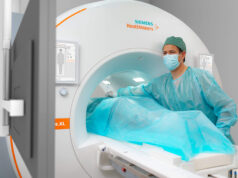 GE HealthCare has recently launched Freelium, a sealed magnet platform that aims to enable high-quality magnetic resonance (MR) imaging with less than 1% of helium used in conventional magnet technology to help support diagnostic accuracy and sustainability goals, a company press release states.
GE HealthCare has recently launched Freelium, a sealed magnet platform that aims to enable high-quality magnetic resonance (MR) imaging with less than 1% of helium used in conventional magnet technology to help support diagnostic accuracy and sustainability goals, a company press release states.
The platform is set to launch at the European Congress of Radiology (ECR; February 26-March 2, 2025, Vienna, Austria). Freelium marks the evolution of GE HealthCare’s established lightweight intelligent platform magnet technology, which was first introduced in 2020.
Freelium is designed to reduce liquid helium usage without compromising power efficiency and operational security. To maintain power efficiency, Freelium aims to operate with no additional cooling and power requirements. Additionally, the company states that the platform’s intelligent sensor technology intends to remotely monitor the MR system and enable automated magnet protection and recovery capability without the need for field engineer intervention. This is particularly important in the event of power outages or disruptions caused by natural events.
To support diagnostic accuracy and confidence, Freelium aims to uphold GE HealthCare’s advanced quality and performance standards. The platform also will be optimised to be compatible with GE HealthCare’s leading AI-enabled solutions. Freelium magnets will be able to be transported and installed in hospitals and in markets where access to helium is limited and without significant helium loss during transport, enhancing patient access to care.
“The unveiling of Freelium reinforces our commitment to provide equitable and sustainable access to MR to any patient and user, while maintaining imaging performance and ensuring seamless operational security for our customers,” said Kelly Londy, president and chief executive officer of Global MR at GE HealthCare. “We’re excited about Freelium’s compatibility with AI-enabled solutions and ability to unlock the full potential of deep learning applications for enhanced diagnostic insights in the future.”










